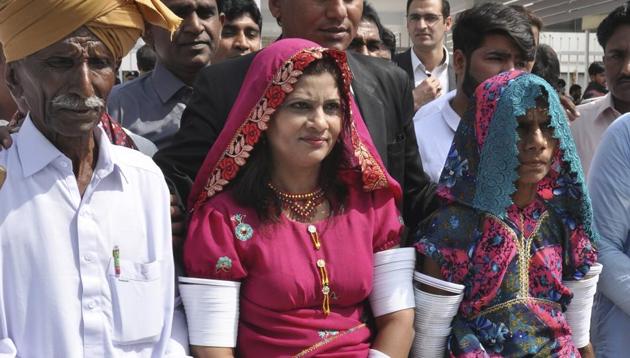Pakistan’s minority voters increase by 30% but are still living on the edge
Reserved seats for non-Muslims are now distributed among political parties in proportion to the number of general constituencies won by them.
The number of voters from Pakistan’s religious minorities has risen from 2.7 million in the 2013 polls to 3.63 million at present, an increase of 30%, but very little has changed for these marginalised communities on the ground.

Political commentator Yasir Latif noted that nobody is even discussing the continued sidelining of these minorities in the political system even though they play an important role in deciding the outcome in numerous constituencies across the country.
Their issues continue to be ignored although, since the resumption of the joint electorate system, issues such as registration of Hindu marriages have been addressed.
Many minority leaders say the most damage was done by the system of separate electorates, which excluded their communities from mainstream politics. Since the creation of Bangladesh in 1971, Pakistan’s religious minorities have numbered less than 5%. Under the 1973 Constitution, this raised questions about their representation.
Initially, this was resolved through in-house election of non-Muslim parliamentarians and legislators. Then military ruler Zia-ul-Haq introduced separate electorates – this meant non-Muslims divided into Christians, Hindus, Ahmadis and other minorities could elect up to 10 members through direct elections but could not vote in general constituencies or Muslim constituencies.
After protests by minority representatives, the joint electorate was re-introduced by Pervez Musharraf’s regime. Reserved seats for non-Muslims are now distributed among political parties in proportion to the number of general constituencies won by them.
But Latif argued both these systems failed to provide effective representation and political influence to the tiny non-Muslim population. “While the separate electorate system provided them with elected representatives, it alienated them from Muslim legislators in the country,” he said.
“Similarly, the joint electorate has given them some influence on Muslim legislators but the representatives they get are all essentially ‘yes men’ of political parties that appoint them. For example, even the Jamiat Ulema-e-Islam has had a Christian on one of these reserved seats, despite the fact that its agenda is entirely anti-minority in every way.”
As things stand, Hindu voters continue to maintain their majority among minorities, but they no longer constitute more than half of all non-Muslim voters as was the case in 2013. Christians form the second largest group but both communities have been increasingly targeted by religious and extremist groups while mainstream politicians looked the other way.
The Ahmadi community, declared non-Muslims in the 1970s, faces the biggest quandary. They refuse to stand or vote as non-Muslims, with the result that they go unrepresented in Parliament.
Members of religious minorities say nothing will change for them in the upcoming elections.
“We continue to live under a shadow,” said Christian leader Kamran Dost. If Pakistan doesn’t change into a more tolerant society, the situation for minorities will not change. “I don’t see any change happening. It continues to be a downward spiral,” he added.
Meanwhile, Britain’s annual human rights report for 2017 highlighted a catalogue of concerns in Pakistan, mainly relating to Hindus, Sikhs and other minorities continuing to suffer persecution and discrimination.
Pakistan is one of the UK’s 30 “human rights priority countries” that includes Myanmar, Sri Lanka, Syria and China. The report, released on Tuesday, said that among the main human rights issues in Pakistan were “restrictions on freedom of expression (and) intolerance towards and discrimination against religious and other minorities”.
It added, “Discrimination and violence against members of religious minorities increased, especially against Ahmadiyya and Christians, but also against Hindus, Sikhs and Shia Muslims. Misuse and abuse of the blasphemy laws were frequent.”
There were recurrent reports during 2017 of forced conversions and forced marriages of Hindu and Christian women. “There was an increased number of major terrorist attacks against civilians and faith targets in Pakistan. Although the majority of terrorist attacks targeted the security forces, other notable incidents included attacks against Sufi shrines in Sindh and Balochistan, Shia areas of Khyber-Pakhtunkhwa, and a Methodist church in Balochistan,” it said.
(With inputs from Prasun Sonwalkar in London)



